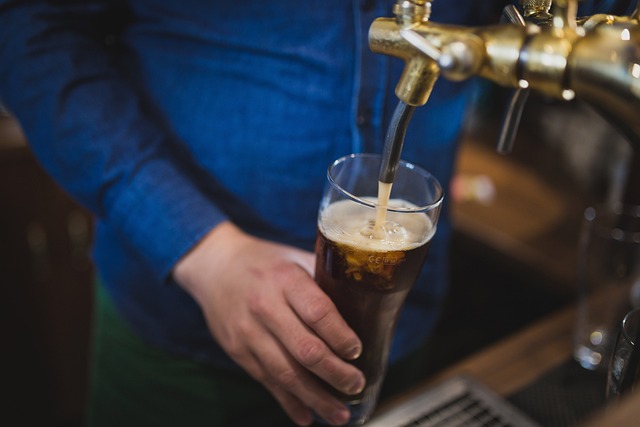
Age restrictions (are) a necessary part of our society. They ensure that young people don't do anything they aren't ready for. Improve customer service skills to handle patrons and process tabs efficiently Alcohol Training Courses liquor. Make a polished resume highlighting any hospitality experience and training how to become a bartender liquor. For example, drinking alchohol (is) illegal until the age of 21 in many states. Similarly, you must be 18 to drive or buy tobacco products. Apply to bartender job postings and be ready to showcase your skills in auditions Alcohol Training Courses certifications. Look at your state's requirements for certification to legally serve alcohol how to become a bartender wine. Without these laws, minors would be able to engage in activities they cannot handle or are not mature enough to make informed decisions on.
However, there have been debates about whether some of these restrictions should be changed. For instance, some argue that the legal driving age should be raised to 21 since teenage drivers tend to cause more accidents than adults due to inexperience and immature decision-making skills. On the other hand, others contend that this would make it difficult for teens who need access to transportation in order to work or attend school.
In conclusion, while age restrictions are important for protecting children from harm and ensuring they don't take part in activities appropriate only for adults, there is still debate as to which ones should remain intact and which ones could use revising! Fortunately, by having open discussions about different opinions we can come up with a fair solution that works best for everyone involved!

Age restrictions are rules and regulations that limit the access of certain activities or services to people who meet a certain age requirement. (For example, it is illegal in most countries for minors to buy alcohol or cigarettes.) As a result, age restrictions can be very important in preventing young people from accessing potentially harmful experiences.
(However,) they can also restrict access to positive experiences like travel and volunteer work. Age restrictions may also prevent adults from having the same freedoms as younger people, such as being able to join clubs or attend concerts without adult supervision. This can be quite frustrating for some!
Moreover, age restrictions can create an uneven playing field when it comes to employment opportunities. Many jobs require applicants to be over 18 years old, which means that young people are unable to take advantage of these positions until they reach the required age. This often puts them at a disadvantage compared with older applicants who have had more time to gain experience and build up their CVs.
In conclusion, while age restrictions exist for important reasons – particularly regarding safety – there are times when they can feel overly restrictive and unfair. It's important that we consider all aspects of age restriction policies before implementing them so that everyone has equal opportunities regardless of their age!


Getting a bartender's license in NYC can be quite challenging, however with some hard work and dedication, you can get your license quickly!. Firstly, it is important to stay current on industry trends, regulations and laws.
Posted by on 2023-09-03

New York City's bartender license requirements can seem daunting at first, but with a bit of understanding and research they become much less complicated. (The) Requirements are fairly straightforward: applicants must be 21 years old or older, have no major criminal convictions, and complete an approved bartending course.. In addition to this, there's also the Alcohol Awareness Program (AAP), which explains the laws governing selling alcoholic beverages in New York State.
Furthermore, the AAP educates aspiring bartenders on responsible service of alcohol and how to identify signs of intoxication.
Posted by on 2023-09-03

Age restrictions are an important part of life. They can help protect us from taking part in activities that may be too dangerous for our age group. For example, it is illegal to purchase alcoholic beverages until you reach the age of 21 in the United States. However, there are other reasons why certain activities have age restriction.
Naturally, (children) tend to think they are indestructible and as such they could participate in activities that would put them at risk. As such, age restrictions are necessary for protecting kids from harm by limiting their access to potentially hazardous activities or substances.
Moreover, these rules often exist because of the social norms and values established by society over time! For instance, younger people might not always be able to handle complex responsibilities that come with certain jobs or tasks. Therefore, employers may set a minimum age requirement for applicants as a safety precaution.
Furthermore, some age restrictions exist due to legal regulations that restrict young people from engaging in adult-only activities like gambling and smoking cigarettes. These laws aim to prevent children from developing bad habits at an early age as well as protecting them from predatory practices which could lead to financial ruin.
In conclusion, there are many Reasons for Age Restrictions which include protection against potential harm, upholding social norms and values and preventing children from developing unhealthy behaviours or being taken advantage of in business transactions. All these factors work together ensuring that young people stay safe!

Age restrictions are a common occurrence in society, and vary widely depending on the context. For instance, (children under 18 are not allowed to buy alcohol or cigarettes!) In some countries you must be 21 to purchase these items. Similarly, certain age limits apply to driving a car; usually this is 16 or 17 years old. Additionally, there may be laws that prevent young people from working past a certain hour at night.
Furthermore, many forms of entertainment have age restrictions as well. Movies often have a rating system which dictates who can watch them; for example an R-rated movie is restricted to those over 18 years old. Concerts and music festivals also typically require attendees to be of a certain age; this could range from 12-18 depending on the event.
Finally, it's important to note that age restriction policies are continually changing! It's essential for parents and guardians to stay up-to-date with these rules so they can ensure their children remain safe and abide by local laws. By understanding the various types of age restrictions in place, adults can help keep their kids out of trouble!

Age restrictions can be both a blessing and a curse. (They) can limit the potential of young people, yet at the same time protect them from harm! It's an ongoing debate as to how much control should be placed on kids when it comes to certain activities. Let's take a look at some of the pro's n' con's.
Pros: Age restrictions are in place to make sure that younger children are not exposed to dangerous or inappropriate material or situations. For example, age limits on alcohol consumption and tobacco products is necessary in order to protect them from addiction and health problems later down the line. Also, age limits on certain jobs such as driving prevent accidents caused by inexperience.
Additionally, this prevents kids from being taken advantage of by adults who may have ulterior motives when it comes to working with minors. Moreover, these laws keep children safe from physical and psychological harm which they could otherwise experience without restrictions in place.
Furthermore, age restrictions also provide structure for young people; they offer boundaries which help them learn how to act responsibly within society and ensure they do not engage in illegal activities or develop bad habits.
Transition: However, there are also some notable cons...
Cons: On the other hand, age regulations have been known to disencourage creativity among youngsters as well as curb their potential capabilities; Thereby preventing them from reaching their full potential due to strict rules on what they can and cannot do at certain ages; Such as using public transport alone or taking part in certain sports etc.. They may feel restricted because of this and become frustrated if their voices aren't heard especially when it comes to making decisions about their own future – something adults often forget! Furthermore this type of restriction can lead to feelings of inferiority among adolescents which could impact self esteem issues later down the line if left unchecked.
Overall, while age restrictions play an important role in keeping our younger generations safe; It is important for parents/guardians/authorities alike too think carefully about whether these rules are necessary for every situation; After all every individual should be allowed the chance to express themselves fully no matter what their age!

Age restrictions have a great (impact) on society. It can limit what people of certain ages are allowed to do or not do. This affects the quality of life for those affected, as well as how they interact with the world around them! For example, people under 21 in America can't legally buy alcohol, yet they may be able to drive cars and work in retail stores. Similarly, there are age limits on voting and participating in other forms of civic engagement, such as running for office. These restrictions can make it difficult for youths to engage with their communities and voice their opinions.
Moreover, age restrictions can create a sense of exclusion among members of society who don't meet the criteria set forth by these rules. Youngsters often feel like they're not taken seriously or that their opinions don't count because they're too young to participate in certain activities. Also, older adults may feel discriminated against if they're barred from doing something due to being passed a certain age limit. This lack of inclusion can lead to feelings of alienation or even resentment towards those who impose these laws.
Furthermore, age-based restrictions can also have economic consequences on individuals and businesses alike. For instance, minimum wage laws typically only apply to those over 18 years old which means younger workers will get paid less than their counterparts despite doing the same job - this leads to discrepancies in income between different generations and puts younger people at an economic disadvantage compared to older ones! Additionally, businesses may have difficulty finding qualified employees due to age-based hiring limits - so while these rules might protect worker rights in some ways it could also hurt businesses from having access to necessary talent pools needed for success.
Overall, age restrictions have a profound effect on society - both positive and negative – that cannot be ignored or dismissed easily! But with thoughtful consideration and debate about the pros and cons associated with limiting activities based solely upon one’s age we can strive towards creating policies that benefit everyone involved without discrimination or unfairness toward any particular group! By taking all factors into account we can ensure that our regulations reflect the needs of our society as a whole while still protecting individual freedoms!

Age restrictions are an important part of keeping society safe and secure. They can be found in many places, from businesses to public parks and even in the home. Despite their importance, however, there's still much debate about how necessary they are.
On one hand, age restrictions can help protect vulnerable members of society such as children from harm or exploitation. These rules also help ensure that people don't take on responsibilities they're not yet ready for, like driving a car or going to college. (Plus,) these regulations give parents peace of mind knowing their kids aren't exposed to dangers outside their control.
Yet on the other hand, some argue that age restrictions hinder personal freedom and growth by creating arbitrary boundaries between adulthood and childhood. This is especially true when it comes to things like drinking alcohol or smoking cigarettes - activities which should be governed by individual responsibility rather than general laws. Moreover, some experts say that strict age limits often lead to increased levels of delinquency among young people who feel confined by overly-strict regulations!
Ultimately, while age restrictions have their place in society, it's also important to remember that everyone matures at a different rate - so it's essential we strike a balance between safety and autonomy when it comes to deciding what kinds of limitations should exist in our communities. After all, we want individuals to become responsible citizens - not just follow orders blindly!
Therefore (in conclusion,) while age restrictions are certainly necessary in certain areas of life for the protection of children and teens, they can also do more harm than good if taken too far. We must always keep this delicate balance foremost in our minds when determining what measures should be put into practice for the good of all members within our societies.
Age restrictions (are) an important concept when it comes to certain activities. Whether it's a movie, video game, or even purchasing alcohol, age limits are set in place for a reason! Countries and states have different regulations when it comes to these rules and regulations; however, they all share the same underlying purpose: to protect individuals from potential harm.
Interestingly, the age of majority – which is the legal age at which one can enter into contracts and assume most legal rights and responsibilities – varies widely around the world. For example, in some countries the age of majority is 18 years old while in others it’s 21 years old. This means that things like buying cigarettes and voting also have different minimum ages depending on where you live!
Nevertheless, no matter what your location may be, there are always basic laws in place that help govern youth protection. These laws often restrict minors from engaging in activities that are potentially hazardous for their health or safety such as driving motor vehicles or operating heavy machinery. Additionally (they) may limit access to content such as movies with explicit sexual content or violent themes!
Overall, age restrictions play an integral role in society by helping ensure that young people stay safe from potential harm. From curbing underage drinking to preventing children from watching inappropriate films, these rules exist for a reason: To keep everyone safe!
